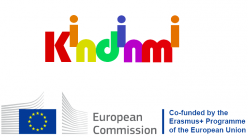The author is an Early Years Practitioner who now works at the University of Aberdeen
I came to the UK from Germany as a 29-year old woman with two young children aged two and ten months old. I had planned to stay for four years, working in a German institution. From 1997 to 2001 I lived in North London with my family. In 2001 we moved to a village in Buckinghamshire. Since 2006 we have been living in a remote part of Aberdeenshire/Scotland, just outside a little village.
Since my children did not speak any English at the time we arrived in London and German was spoken at home I was keen for the children to learn English. My son needed to start nursery within months and I was advised by the local pre-school to mention on my enrolment form that he was not a native speaker. I was told that he would be treated favourably on the waiting list. My son could attend nursery, which was an inner city local authority infant school, almost immediately. The infant school had an intake of over 50% non-native speakers coming from countries like Turkey, Iran, Nigeria, China, Norway and Hungary.
My son picked up the English language very quickly without any additional support from the school. Most immigrant parents found it more difficult, especially since in most cases both parents were foreigners and all families spoke their mother tongue at home. Some of the parents started to meet up after nursery/school to socialise and improve on their English. We were very much aware that hardly any native speakers were part of the group.
My children very quickly became part of a tight North London community, accessing sports facilities, meeting up with their friends etc. and English became their main language despite German being spoken at home.
After two years the dynamic changed and by meeting my partner and father of my third child, our language at home changed from German to English. My partner does not speak German and neither does my third child despite me trying to speak to her in German. My older children continued to get enough exposure to the German language by visiting their German father as well as other relatives in the holidays. They are now 22 and 24 -years old and bilingual. Their use of the English language is better than their German because they have spent most of their lives in the UK.
It certainly helped that my partner is British, bringing another three English speaking children into the family. We were all completely absorbed into the British culture, suddenly experiencing Christmas on the 25thof December rather than the 24th. Although we held on to certain German traditions for a few years, we now celebrate a real mix of British and German traditions.
Both children found it easier to pick up foreign languages like French and Spanish and growing up bilingual might have helped them with it. They are comfortable in both cultures and travel a lot. Being between two cultures encouraged them to try out different career pathways. Both completed their studies in Edinburgh but continued with MA’s internationally, my daughter in Amsterdam, my son in Turin and Toulouse.
My daughter however regularly points out the disadvantages of growing up somewhere else. She feels like she does not have a close extended family anywhere and has recently tried to revisit her German family roots. She craves a clear German identity and gets nostalgic about German culture, food etc. When asked if she could imagine living in Germany she honestly confesses that she could not, despite glorifying her parents’ home country.
We had difficulties with the British Home Office in the past. My youngest child who was born in the UK to a British father could not acquire a British passport. She only got “naturalised” recently which cost us a lot of money and patience. My older children who were not born in the UK but have been living here for most of their lives would have to go through an even more difficult process. They are still registered in Scotland but may face difficulties coming back into the UK after the completion of their MA’s in 2019.
Brexit feels strange to them, especially since they have embraced Britain as their home country.

